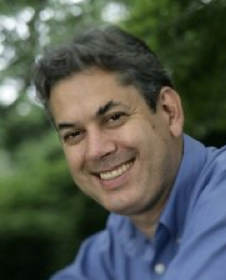People
Sam Fromartz learns in Paris how to bake a stellar baguette
Monday 7 September 2009
 Samuel Fromartz (photo), former Reuters journalist in New York and Washington turned food writer and blogger, has realised a long-held dream: to bake baguettes in a Paris boulangerie.
Samuel Fromartz (photo), former Reuters journalist in New York and Washington turned food writer and blogger, has realised a long-held dream: to bake baguettes in a Paris boulangerie.
He found it surprising, shocking even, that in the depths of the recession he got a chance to travel to Paris and try his skills at artisan breadmaking. “This was a long-held dream of mine, since I've been baking bread at home for a decade.”
The opportunity came thanks to a new magazine - Afar, which highlights "experiential travel". It’s a kind of a hipster's National Geographic, he says.
Fromartz went to a boulangerie on rue des Martyrs in the 9th arrondissement.
“As an avid home baker with a decade of experience slapping around dough, I had come to Paris to learn how to make a stellar baguette. I wanted one with a crisp crust, uneven bubbly interior (called the crumb), and distinctive flavor that would make friends at home in Washington, D.C., ooh and aah. I figured Arnaud Delmontel was the one to teach me: A master baker, uncompromising about ingredients and technique, he had won the award for best baguette in Paris in 2007.
“I also wanted to investigate a cultural question: Why had bread, which held a commanding place at the French table, crumbled into mediocrity in the decades following World War II? By the 1980s, it was an open secret in the baking trade that truly great French bread was a rarity, as speed and efficiency increasingly trumped the slow fermentation necessary for an outstanding loaf. In 1987 a cultural critic writing in the French newsmagazine Le Nouvel Observateur proclaimed that the baguette had become ‘horribly disgusting.’ It was ‘bloated, hollow, dead white,’ he said. ‘Soggy or else stiff. Its crusts come off in sheets like diseased skin.’ Renowned French baking professor Raymond Calvel mused that the best baguette might soon be made in Tokyo. What had brought this on? And how was quality bread revived in the 1990s? The answers to these questions lay in Paris, which is what brought me to the door of Boulangerie Arnaud Delmontel at 3 a.m. that morning last February.”
“When I returned from Paris, I came up with a home-baked baguette that topped bakeries in DC in a blind tasting competition and caused a bit of a stir on the Net.”
“Back home in Washington, I called Delmontel one day to complain that the flour I used wasn’t as good as his and that the bread didn’t taste the same. ‘Look, whether it’s the same flour I use is not important,’ he scolded. ‘The most important thing is to make people happy, to love what you have done!’ Then I remembered: This was the lesson I had witnessed every day in France. It was the source of great bread, the most important rule. And now it was mine.”
Fromartz (Reuters 1985-1997) runs a website - ChewsWise - to spread the word on organic and sustainable food. His book, Organic Inc.: Natural Foods and How They Grew, was published in 2006.
- « Previous
- Next »
- 555 of 582